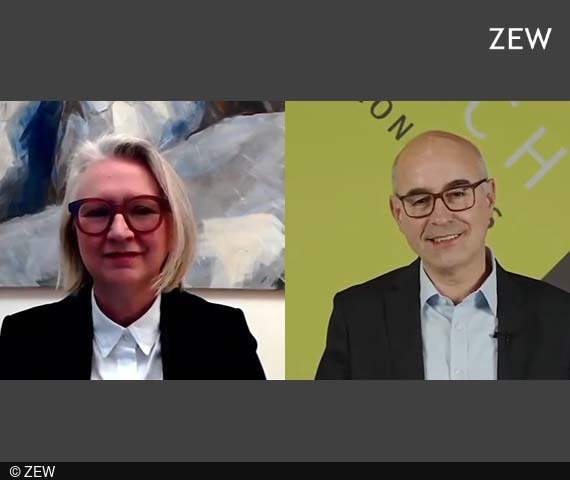“Education Is Key for Mastering the Transformation”
Public EventsFirst Hand Information on Economic Policy with Professor Monika Schnitzer
Lockdowns, inflation, and material and supply bottlenecks were major factors that slowed down the economic recovery this year. The German Council of Economic Experts addresses these issues in its annual report 2021/2022. Professor Monika Schnitzer, member of the Council, presented the key statements of the report and discussed them with ZEW President Professor Achim Wambach in an online event at ZEW Mannheim on 9 December 2021. In the report, the Council discusses measures for the transformation of education, digitalisation and sustainability.
Monika Schnitzer began her impulse speech by emphasising that the COVID-19 pandemic continues to have an impact on society and the economy. “Nevertheless, we are forecasting significant economic growth of 4.6 per cent for next year,” Schnitzer said. She added, “The economic recovery could only be delayed by new, significant shortages in supply.” The number of insolvencies caused by the pandemic was significantly lower than in previous crises, including the financial crisis. “Policy instruments such as the short-time work scheme prevented dramatic effects on the labour market, as the lower number of job losses demonstrates,” Schnitzer said, summarising the report’s findings. Individuals in marginal employment, low-skilled workers and the self-employed were most affected.
How can education, digitalisation and sustainability be successfully transformed?
Schnitzer noted that while social inequality has not increased, education has been negatively affected. Especially disadvantaged children and those who already had difficulties in school now show deficits in development and education due to school closures during the pandemic. Mentoring programmes for individual pupils or small groups, as well as private tutoring, must no longer be available only to children from academic households, but must be accessible to all children. Due to the ever-increasing importance of digitalisation, a broad-based transformation is necessary. “Germany needs an extensive, coherent and nationwide digitalisation strategy,” said Schnitzer. With regard to sustainability, she emphasised that global climate protection efforts can only be successful in international cooperation.
The Council agreed in its report that transformation can only be achieved by creating reliable and growth-enhancing framework conditions. Furthermore, it is necessary to simplify procedures in order to reduce non-monetary obstacles. The Council presented strategies to increase private and public investment in the context of the German “debt brake”, as well as ways to apply and reform European fiscal rules.
Investment and the German “debt brake”: hot topics of discussion
In the subsequent discussion, ZEW President Achim Wambach asked whether there was less discussion among the Council members than usual in the context of the 2021/22 report. “We already saw differing opinions last year, after two new members joined,” replied Schnitzer. This year, two members argued that the need for public investment was unclear and the focus was more on private investment, the economic expert explained, adding: “Achim Truger and I estimate the public investment needs much higher, which requires a legally secure and sustainable financing strategy to stabilise investment spending.” So there have definitely been lively discussions again.
“How important is further education for skilled professionals?” the ZEW President wanted to know. “Education is the central prerequisite for mastering the transformation. Further education should also be an integral part of everyone’s professional life.” Also, more employment incentives are required for secondary earners, such as part-time employees, to ensure they are available on the labour market. According to Schnitzer, reforming rules on income splitting for married couples and increasing the availability of childcare could be first steps. Furthermore, they talked about why an investment rule has not yet worked out in Germany, whether or not the low number of business closures during the pandemic had benefited the economy and how inflation will develop. More than 135 participants followed the digital event at ZEW Mannheim, which took place as part of the lecture series “First-Hand Information on Economic Policy”.
